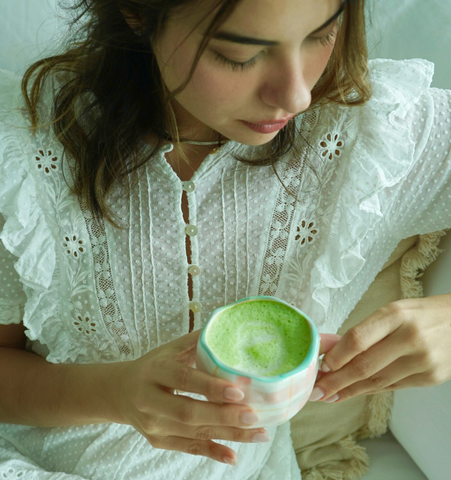Delving into the world of matcha, an exquisite and vibrant green tea matcha powder, is an adventure that tantalizes the taste buds and opens up a whole new realm of flavors. But what exactly does matcha taste like? As we sip this centuries-old Japanese treasure, we discover a unique and delightful combination of matcha tastes that make it an unparalleled experience.
1. Earthy and Grassy

One of the defining characteristics of matcha is its earthy and grassy flavor profile. Derived from shade-grown tea leaves, matcha develops a distinct essence that is reminiscent of the lush, fertile fields from which it originates.
This natural, plant-like essence adds a touch of freshness to the overall taste, leaving a subtle but gratifying sensation.
2. Umami Richness

Beyond its earthy notes, matcha presents a delightful umami flavor. Umami, known as the fifth taste, is often described as savory and rich, imparting a satisfying and comforting essence.
This unique characteristic is a result of the green tea leaves shading process, which enhances the presence of amino acids, specifically L-theanine.
The delightful umami undertones elevate matcha to a level of flavor sophistication that sets it apart from other teas.
3. Slight Astringency

While matcha embodies a smooth and creamy texture when prepared correctly, it also carries a subtle astringency. This slight bitterness adds complexity to the flavor profile, balancing the overall taste and enhancing the experience of drinking matcha.
When combined with its other attributes, the gentle astringency lends a well-rounded and harmonious character to matcha.
4. Sweetness with No Added Sugar
Surprisingly, matcha contains a natural sweetness despite having no added sugar. This inherent sweetness complements the earthy and savory notes, creating a delightful interplay of flavors that is both satisfying and enjoyable.
The combination of natural sweetness and umami creates a delicious harmony that makes matcha a favorite among tea enthusiasts.
5. Creamy and Velvety

When whisked to perfection, matcha develops a luxurious and creamy texture that caresses the palate. This velvety consistency adds a touch of indulgence to every sip, elevating the overall drinking experience to a state of pure enjoyment.
The velvety mouthfeel of matcha creates a delightful contrast with its herbal notes, making it a delightful and satisfying treat.
6. Nutty Undertones
In addition to its grassy and earthy essence, matcha carries a hint of nuttiness that further enriches its flavor. This subtle nutty undertone adds depth and character to the overall taste, enhancing the complexity of the tea.
The combination of nutty, earthy, and sweet elements creates a delightful symphony of flavors that captivates the senses.
Unlocking the Flavor Palette: Exploring Yoko Matcha's Distinctive Matcha Grades
As we embark on the captivating journey of matcha, Yoko Matcha proudly unveils its diverse range of matcha grades, each offering a unique taste and experience. From the ceremonial grade, daily grade, to the culinary grade, Yoko Matcha's selection caters to all taste preferences, ensuring a delightful matcha experience for every tea enthusiast.
1. Ceremonial Grade Matcha: Unraveling Elegance
Yoko Matcha's ceremonial grade matcha stands at the pinnacle of flavor excellence. Carefully sourced from the revered tea fields of Honyama, Shizuoka, this grade embodies the essence of Japanese tradition and craftsmanship.
Its smooth and velvety texture encapsulates a delicate fusion of earthy, grassy undertones with refined sweetness, enchanting the palate with every sip.
Elevating the traditional tea ceremony, Yoko Matcha's ceremonial grade is a harmonious blend of authenticity and indulgence.
2. Daily Grade Matcha: Embrace the Everyday Pleasure
For those seeking a matcha to be savored daily, Yoko Matcha's daily grade is a perfect choice. Sourced from the second harvest of the Camellia sinensis plant, this grade boasts a balance of flavors that caters to versatile preparations.
Revel in the delightfully creamy and slightly sweet taste, coupled with a subtle astringency that adds depth and character. Yoko Matcha's daily grade becomes a cherished companion, elevating your daily rituals with a moment of tranquility and nourishment.
3. Culinary Grade Matcha: A Whisk of Creativity
Stepping into the world of culinary exploration, Yoko Matcha's culinary grade becomes a canvas for creativity.
Derived from the third harvest, this grade lends its vibrant green hue and distinctive earthy flavor to a plethora of culinary delights. Be its delectable desserts, matcha-infused beverages, or culinary creations, the culinary grade embraces versatility with open arms.
Its robust flavor, coupled with nutty undertones, allows you to venture into the realm of matcha-inspired gastronomy.
How to Recognize Good and Bad Matcha

Recognizing good and bad matcha involves considering several factors related to the color, aroma, texture, taste, and overall quality of the tea. Here's a guide to help you distinguish between high-quality and lower-quality matcha:
Color
-
Good Matcha: Vibrant and vibrant green color. Higher-grade matcha tends to have a more intense and bright green hue.
-
Bad Matcha: Dull or yellowish-green color. Lower-quality matcha may appear faded or less vibrant.
Aroma
-
Good Matcha: Fresh, grassy, and slightly sweet aroma. High-quality matcha has a pleasant and inviting fragrance.
-
Bad Matcha: Stale, musty, or off-putting aroma. Lower-quality matcha might have an unpleasant scent.
Texture
-
Good Matcha: Fine, smooth, and silky texture. When rubbed between fingers, it should feel soft and powdery.
-
Bad Matcha: Gritty or coarse texture. Poorly ground matcha might feel grainy to the touch.
Taste
-
Good Matcha: Complex flavor profile with a balance of sweetness, umami, and slight bitterness. High-quality matcha offers a smooth and enjoyable taste.
-
Bad Matcha: Overly bitter, astringent, or excessively grassy. Lower-quality matcha may have unpleasant bitterness without the characteristic umami.
Foam and Liquor
-
Good Matcha: Whisks into a creamy, frothy foam when prepared traditionally. The resulting liquor should have a rich, velvety texture.
-
Bad Matcha: Doesn't produce a stable foam or has a thin, weak foam. The liquor might lack body and richness.
Origin and Source
-
Good Matcha: Sourced from reputable tea producers or regions known for high-quality matcha, such as Uji in Japan.
-
Bad Matcha: Origin is unclear or from regions with a lower reputation for producing quality matcha.
Price
-
Good Matcha: Higher-quality matcha is generally more expensive due to the meticulous cultivation, harvesting, and processing methods involved.
-
Bad Matcha: Extremely low-priced matcha may signal lower quality, as producing high-quality matcha requires careful attention to detail and costs.
Transparency and Packaging
-
Good Matcha: Transparent packaging that allows you to see the color and texture of the matcha. Reputable brands often provide information about the tea's origin and processing methods.
-
Bad Matcha: Opaque packaging that hides the contents or lacks information about the tea's quality.
Clumping
-
Good Matcha: Easily sifts and dissolves when whisked, resulting in a smooth texture.
-
Bad Matcha: Clumps or doesn't fully dissolve when mixed, indicating poor grinding and quality.
In general, it's a good practice to buy matcha from trusted sources, especially those that provide information about the tea's origin, grade, and processing methods.
While these guidelines can help you distinguish between good and bad matcha, personal taste preferences also play a role. Experiment with different matcha varieties to find the one that aligns with your flavor preferences and expectations.
Embrace the Matcha Symphony of Yoko Matcha

At Yoko Matcha, we believe that the true essence of matcha lies not only in its flavor but in the stories that intertwine with each sip. Our matcha, sourced from the revered tea fields of Honyama, Shizuoka, embodies the rich history and heritage of Japanese tea culture.
The fertile soils, meticulous craftsmanship, and dedication to quality give rise to matcha that is unparalleled in taste and experience.
From the exquisite ceremonial grade to the versatile culinary grade, Yoko Matcha's diverse matcha grades are a testament to our commitment to quality and taste.
Embrace the matcha symphony that unfolds with each grade, and let Yoko Matcha become an integral part of your tea-drinking journey.
Discover the harmony of flavors, immerse in the tranquility, and indulge in the richness of Yoko Matcha's matcha grades, crafted to elevate your matcha moments to pure bliss.
Embrace the Matcha Journey
In summary, matcha delights the taste buds with its earthy, grassy, and umami-rich essence. Its slight astringency balances the flavor, while its natural sweetness and creamy texture add depth and indulgence.
The nutty undertones further enrich the experience, creating a harmonious and captivating flavor profile.
Whether you're sipping a traditional matcha tea ceremony or indulging in a matcha latte, the taste of matcha is an enchanting experience that is both soothing and invigorating.
Its complexity and unique attributes make matcha a treasure to be savored and celebrated, inviting all to embark on a delightful journey of taste and appreciation.
So, steep in the world of matcha, embrace its captivating flavors, and let this exceptional matcha green tea powder elevate your tea-drinking experience to new heights.
FAQs
What is matcha, and why is its taste unique?
Matcha is a type of powdered green tea that originates from Japan. Its taste is distinct due to the way it's grown, processed, and prepared.
How would you describe the taste of matcha?
Matcha has a rich, earthy flavor with a slightly sweet and vegetal undertone. It often has a creamy or umami-like quality, which sets it apart from regular green tea.
Is matcha bitter like some other green teas?
Matcha can be slightly bitter, but the bitterness is usually balanced by its sweetness and umami. The level of bitterness can vary depending on the quality and preparation.
Does matcha taste like regular green tea?
Matcha and regular green tea come from the same tea plant, but they taste different. Matcha is more concentrated, creamier, and has a more complex flavor profile compared to regular green tea.
Can the taste of matcha vary depending on its grade?
Yes, the taste of matcha can vary based on its grade. Higher-grade matcha tends to have a smoother, sweeter, and more complex flavor, while lower-grade matcha may be more bitter and astringent.
What factors affect the taste of matcha?
Several factors influence the taste of matcha, including the tea cultivar, growing conditions, processing methods, and the way it's prepared.
Are there different flavor profiles for ceremonial and culinary matcha?
Yes, ceremonial matcha is typically of higher quality and has a smoother, sweeter, and more delicate flavor profile. Culinary matcha, on the other hand, is often used in recipes and can have a stronger, slightly bitter taste.
Can you add flavors to matcha to change its taste?
Yes, you can enhance the taste of matcha by adding various ingredients like honey, milk, or flavored syrups. These additions can make it sweeter or creamier, depending on your preferences.
Does matcha taste better hot or cold?
The taste of matcha can be enjoyed both hot and cold. Some people prefer the traditional hot matcha, while others enjoy it as an iced beverage. The choice is a matter of personal preference.
Can you describe the aftertaste of matcha?
Matcha often leaves a lingering, pleasant, and slightly sweet aftertaste in your mouth, which is one of its distinctive characteristics.
Are there any foods or flavors that pair well with matcha?
Matcha pairs well with a variety of foods, including sweets like matcha-flavored pastries, chocolates, and ice cream. It also complements savory dishes and can be used as a seasoning in some recipes.
Is matcha an acquired taste?
Some people may find matcha's unique flavor an acquired taste, especially if they are not accustomed to the earthy and slightly bitter notes. However, many individuals grow to appreciate and enjoy its taste over time.








